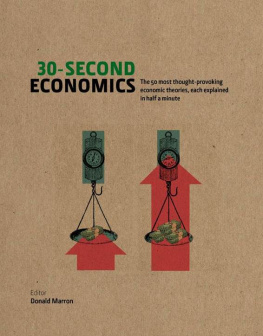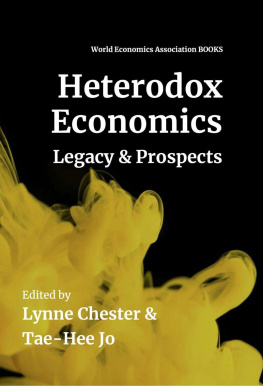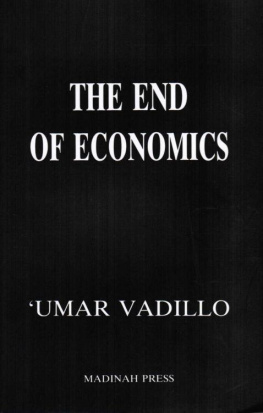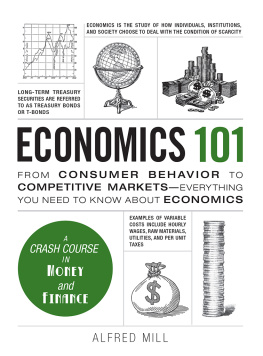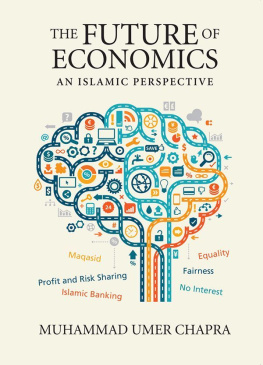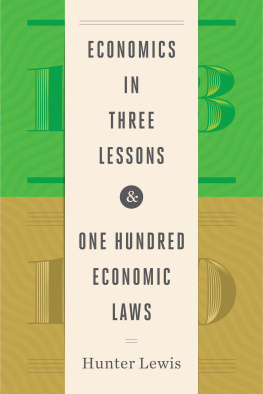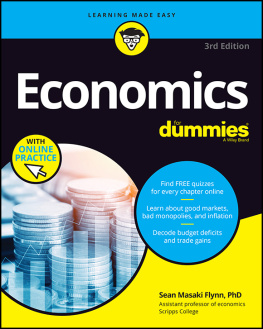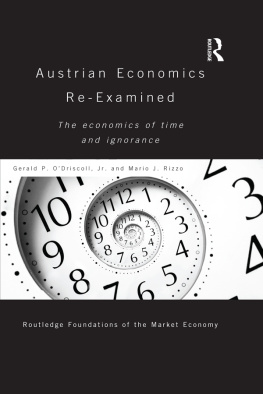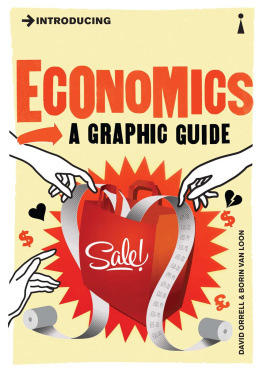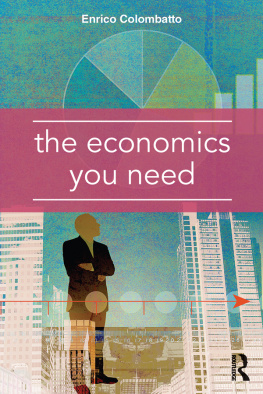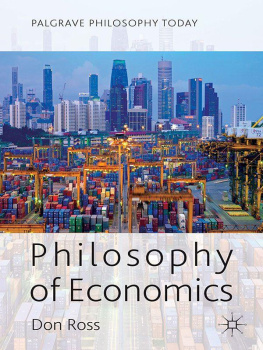Donald Marron - 30-Second Economics
Here you can read online Donald Marron - 30-Second Economics full text of the book (entire story) in english for free. Download pdf and epub, get meaning, cover and reviews about this ebook. year: 2010, publisher: Ivy Press, genre: Politics. Description of the work, (preface) as well as reviews are available. Best literature library LitArk.com created for fans of good reading and offers a wide selection of genres:
Romance novel
Science fiction
Adventure
Detective
Science
History
Home and family
Prose
Art
Politics
Computer
Non-fiction
Religion
Business
Children
Humor
Choose a favorite category and find really read worthwhile books. Enjoy immersion in the world of imagination, feel the emotions of the characters or learn something new for yourself, make an fascinating discovery.
- Book:30-Second Economics
- Author:
- Publisher:Ivy Press
- Genre:
- Year:2010
- Rating:4 / 5
- Favourites:Add to favourites
- Your mark:
- 80
- 1
- 2
- 3
- 4
- 5
30-Second Economics: summary, description and annotation
We offer to read an annotation, description, summary or preface (depends on what the author of the book "30-Second Economics" wrote himself). If you haven't found the necessary information about the book — write in the comments, we will try to find it.
30-Second Economics — read online for free the complete book (whole text) full work
Below is the text of the book, divided by pages. System saving the place of the last page read, allows you to conveniently read the book "30-Second Economics" online for free, without having to search again every time where you left off. Put a bookmark, and you can go to the page where you finished reading at any time.
Font size:
Interval:
Bookmark:
The 50 most thought-provoking economic theories, each explained in half a minute
Editor
Donald Marron
Contributors
Adam Fishwick
Christakis Georgiou
Katie Huston
Aurelie Marechal

Published in the UK in 2011 by
Icon Books Ltd
Omnibus Business Centre
3941 North Road, London N7 9DP
email:
www.iconbooks.co.uk
2010 by Ivy Press Limited
The editor and contributors have asserted their moral rights.
No part of this book may be reproduced in any form, or by any means, without prior permission in writing from the publisher.
This book was conceived,
designed, and produced by
Ivy Press
210 High Street, Lewes
East Sussex, BN7 2NS, UK
www.ivypress.co.uk
Creative Director: Peter Bridgewater
Publisher: Jason Hook
Editorial Director: Caroline Earle
Art Director: Michael Whitehead
Designer: Ginny Zeal
Concept Design: Linda Becker
Illustrator: Ivan Hissey
Profiles and Glossaries Text:
Nic Compton
Picture Researcher: Katie Greenwood
Digital Assistant: Emily Owen
Digital ISBN: 9781848314498
Economics wants to be the physics of the social sciences. Physicists examine how fundamental natural forces shape everything from the movements of subatomic particles to the orbits of heavenly bodies. Economists, in turn, study how fundamental social forces explain everything from the price of bread to the wealth disparity between the United States and Zimbabwe.
The theme of this book is that economists have been succeeding, but economics will never be physics. Over the past two centuries, economists have developed a host of theories many described in the pages that follow that explain how markets work and sometimes fail, how consumers, workers, firms and politicians make decisions, and why economies grow or stagnate.
Those theories have their limitations, however, because humans are less predictable than particles and planets. Economies are complex (more like ecosystems) and so our understanding of them sometimes falls short; our near-universal failure to foresee the worst financial and economic crisis in eight decades is a sorry but perfect case in point.
The science of economics is thus still a work in progress; and it may end up resembling biology more than it does physics. But economics isnt just a science. Many economists, myself included, believe that our insights into how the world works have implications for how the world should work in general. As a result, the scientific theories of economics blur into political theories of the good society.
Both sets of theories the scientific and the political can have great impact. As John Maynard Keynes once put it: The ideas of economists and political philosophers, both when they are right and when they are wrong, are more powerful than commonly understood. Indeed, the world is ruled by little else. Practical men, who believe themselves to be quite exempt from any intellectual influence, are usually the slaves of some defunct economist.
Many of the top fifty theories in economics can indeed be traced to economists who are defunct, at least in the biological sense (including Keynes himself). But the theories themselves remain vibrant. As Keynes warns, however, important theories are not always right. So mixed among the most important theories you will find a few that are almost certainly wrong, despite their influence. See if you can find them.
Each 30-second theory is presented alongside a 3-second crash for those in a particular hurry, in addition there is a 3-minute boom for those who want to delve a little deeper. The first group of economic theories, Schools of Thought, examines the large-scale forces markets, inertia, history that determine how the macroeconomy actually works. Economic Systems then presents theories of how economies should be structured with greater and lesser faith in markets and how struggling economies can improve. In Economic Cycles, we look at the factors that drive economic ups and downs and the possible role of government in smoothing them. Growth examines how the proper blend of capital, labour, resources, ideas and social institutions can foster prosperity. Global Trade looks internationally, explaining how products and capital flow around the world. Choice peers into our heads in order to see how individuals make decisions in the marketplace, in the home, and in the public sphere. Tax & Spend Policies examines the sometimes surprising effects of government tax and spending policies. Markets, finally, documents the remarkable power of market forces, from the miracle of the invisible hand to the tragedy of the commons. Along the way, each section presents a quick profile of some of the most important economists, from Adam Smith to John Maynard Keynes to Milton Friedman.
How should you enjoy this book? Well, the individual essays are great for sampling but, as with potato crisps, you probably wont be able to stop with just one theory. Enjoy.

aggregate demand The total demand for goods and services within an economy at a certain time. This can be influenced by government either through monetary policy (that is controlling the amount of money in the economy) and/or fiscal policy (that is increasing/decreasing the amount of government expenditure).
exchange value The theoretical value for which a product or service can be tradedas opposed to the actual value for which it is traded, which is its price. Exchange value can be described as the quantitative value of a commodity, as opposed to use value, which is its qualitative value.
fiscal policy The way in which government uses public spending and taxation to influence a countrys economic performance. Thus, a government may choose to tax more and invest in social security and public works, such as roads and hospitals, to create employment, and to increase salaries. Or it may choose to reduce public spending in order to reduce taxation, so that people have more money to spend in the first place. Its swings and roundabouts!
Keynesianism A school of thought created by the British economist John Maynard Keynes in the 1930s. Unlike most economists of the day, who believed that the market mechanism produces the most efficient outcome, Keynes believed that the market needed to be tempered by government intervention. He advocated the use of countercyclical fiscal policies, whereby the government pumps money into the economy when times are hard, but reduces spending when times are good.
laissez-faire An economic approach that advocates minimum government intervention (from the French, meaning let it be). Proponents of this approach believe that the market will achieve the most efficient outcome and that government regulations distort the reality of the market, leading to inefficiency.
monetary policy The way in which government uses the supply of moneyor, more specifically, interest ratesto influence a countrys economic performance. Generally, low interest rates tend to increase the amount of money in circulation, which can help stimulate an economy during a recession; high interest rates tend to reduce the supply of money and can be used to reduce inflation.
Font size:
Interval:
Bookmark:
Similar books «30-Second Economics»
Look at similar books to 30-Second Economics. We have selected literature similar in name and meaning in the hope of providing readers with more options to find new, interesting, not yet read works.
Discussion, reviews of the book 30-Second Economics and just readers' own opinions. Leave your comments, write what you think about the work, its meaning or the main characters. Specify what exactly you liked and what you didn't like, and why you think so.

